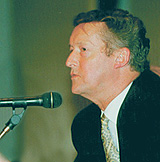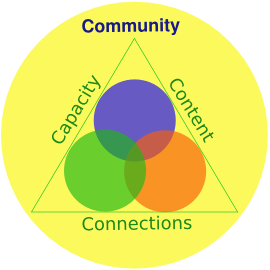WikiEducator:About
Contents
Introduction
WikiEducator is a community project working collaboratively with the Free Culture Movement towards incremental development of open educational resources. Driven by the learning for development agenda we focus on:- building capacity in the use of Mediawiki and related free software technologies for mass-collaboration in the authoring of free content
- developing free content for use in schools, polytechnics, universities, vocational education institutions and informal education settings
- facilitating the establishment of community networks and collaboration with existing free content initiatives in education
- fostering new technologies that will widen access, improve quality and reduce the cost associated with providing education, primarily through the use of free content
- supporting collaborative development of OERu courses to widen access to tertiary education
Sir John Daniel, President and Chief Executive Officer of the Commonwealth of Learning was the founding patron of WikiEducator. The project has adopted a community governance model which is coordinated by WikiEducator's Open Community Council, building on the work of the Interim International Advisory Board. Ambassadors for WikiEducator promote the project around the globe, and our technology roadmap helps us make the future happen.
WikiEducator's technical infrastructure was supported by a financial contribution by the Commonwealth of Learning (COL) to the Open Education Resource Foundation an independent international non-profit headquartered at Otago Polytechnic New Zealand.
Strategy
WikiEducator aims to build a thriving and sustainable global community dedicated to the design, development and delivery of free content for learning in realisation of a free version of the education curriculum by 2015.
In realisation of this vision, the WikiEducator strategy will focus on:- Building the capacity and skills of the community to engage meaningfully in the mass-collaboration required for the design and development of high quality learning resources, for example capacity building workshops.
- Developing free content and knowledge to support the development of open communities and free content developers so that resources can be reused in multiple contexts, for example the Newbie Tutorials.
- Ensuring smart connections through appropriate networks, ecosystems and the smart implementation of free software solutions to fill the gaps between existing mainstream technologies and the unique requirements of asynchronous learning thus widening the reach and access of free content in the developing world. This is achieved through community nodes on WikiEducator (e.g. VUSSC, FLOSS4Edu), technology think tank meetings (e.g. Tectonic Shift Think Tank) and fostering strategic relationships with the freedom culture (e.g. Wikiversity and the WikiMedia Foundation).
The strategy is divided into three distinct phases.
Phase 1: Establishing foundations (May 2006 - Dec 2007)
This phase involves setting up the technologies and processes to facilitate community development for free content. This is achieved by:
- building capacity to participate;
- developing free content on how to develop free content;
- through a process of self organisation, providing the community the freedom to determine the kinds of projects, structures and communication mechanisms for WikiEducator;
- establishing a democratic governance model from the community for WikiEducator;
- collaborative and democratic development of community policies that support and promote the values of the WikiEducator community;
- strategic relationships networking to ensure the right connections for a sustainable community.
Phase 2: Scaling up free content development (Jan 2008 - Dec 2008)
The prime purpose of Phase 2 is to scale up the rate and quality of free content development building on the foundations established during Phase 1. Phase 2 will be realised through ongoing community development with special emphasis on scalable capacity development, including for example:
- The Learning4Content project which aims to provide free training for educators in return for a lesson of free content on WikiEducator
- Establishing clear pathways for a wide range of skilled individuals to contribute to WikiEducator projects by:
- Developing a one stop "portal" which clearly communicates which projects need help and support;
- Differentiating and communicating the skills requirements for individual projects, for example learning design, content design, multimedia and visual design, linguistic design, research and technical design;
- Policy and practice guidelines for the design and development of learning content drawing on the research and experience of distance education, for example the Learning Design project.
- Establish quality assurance mechanisms appropriate for educational content, for example implementation and refinement of the FlaggedRevs initiative.
- Development and implementation of a fund raising strategy for the WikiEducator community.
- Seeding the establishment of regional and national chapters of mainstream WikiEducator initiatives.
- Ongoing refinements to existing technologies and the search for free software solutions to scale up the rate of free content production.
Phase 3: Sustainable implementation of free content in education (Jan 2009 - )
The purpose of this phase is to prioritise activities which implement free content into mainstream educational activities. The success of the free content movement in education will be measured when real students enroll in real programmes using free content.
The flagship project will be the Commonwealth Computer Navigator's Certificate to collect evidence on the merits and value proposition of free content in real educational contexts.
Quick facts and highlights
| Date | Selected milestones | No. Registered users |
|---|---|---|
| Feb 2006 | Wayne registers the domain names for:
|
Nil |
| Feb 2006 | Installed the Mediawiki software on a desktop machine at the University of Auckland, New Zealand. WikiEducator was originally conceived as an experimental wiki to host content developed by the eXe community and to explore the potential for collabrative development of eLearning content the wiki way. | 10 |
| April 2006 | WikiEducator relocated to a hosted server. Hosting services provided by Erik Möeller and funded by COL | 12 |
| August 2006 | Strategic plan for WikiEducator submitted under the eLearning for Education Sector Development initiative as part of COL's three-year plan, 2006 - 2009. | 17 |
| October 2006 | WikiEducator brochure uploaded to the site. | 80 |
| November 2006 | FLOSS4Edu project launched in Kenya | 142 |
| January 2007 | WikiEducator mailing list created by Brent Simpson | 285 |
| February 2007 |
|
491 |
| April 2007 |
|
803 |
| May 2007 | WikiEducator achieves 1,000 users. | 1,000 |
| October 2007 | William and Flora Hewlett Foundation announce a $100,000 grant for the Learning4Content project. | 1,400 |
| December 2007 |
|
2,165 |
| January 2008 | WikiEducator launches the Learning4Content project | 2,515 |
| May 2008 | WikiEducator is the inaugural recipient of the 2008 Merlot Africa Network and eLearning Africa (MANeLA) award in the Free Software for OER Content Authoring category. | 3,892 |
| June 2008 |
|
4,221 |
| August 2008 | OER Handbook for Educators goes to print | 5,418 |
| September 2008 | Results of the first WikiEducator community elections announced. | 5,941 |

